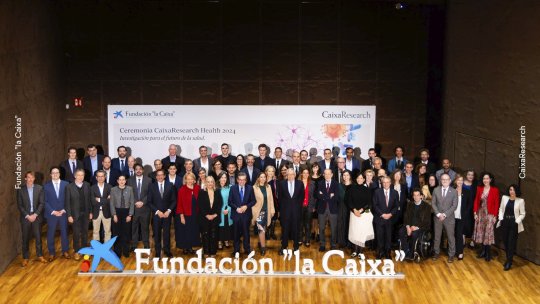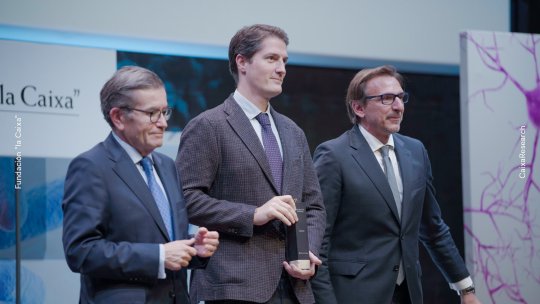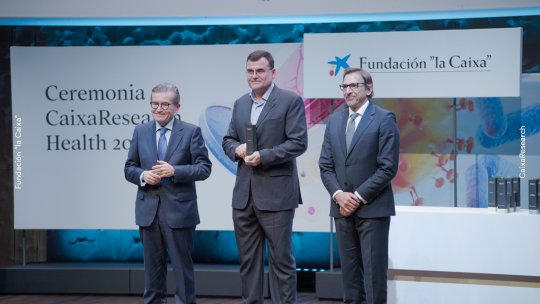Images
Contact

- IRB Barcelona receives funding for two research projects, headed by Drs. Eduard Batlle and Roger Gomis, in the CaixaResearch call.
- The CaixaResearch call has awarded €25.7 M for fundamental, clinical and translational research projects.
”la Caixa” Foundation has selected 29 new biomedical research projects of excellence with a significant social impact for the CaixaResearch Health Research 2024 Programme, which is endowed with €25.7 M. These projects will be carried out at research centres, hospitals, and universities in Spain and Portugal.
The call for proposals, which received 580 basic, clinical, and translational project proposals in this seventh edition, is particularly focused on addressing health challenges in various areas: infectious diseases (with 7 selected projects), oncology (6), cardiovascular and metabolic diseases (5), and neuroscience (5). In addition, 6 other selected proposals will develop enabling technologies in one of these fields.
CaixaForum Madrid hosted yesterday the award ceremony, which was attended by representatives of the ”la Caixa” Foundation, including the deputy general manager, Juan Ramón Fuertes; the chair of the Foundation’s scientific committee, Javier Solana; the director of relations with research and health institutions, Ignasi López; the trustee of the Foundation and honorary chair of the Banco Português de Investimento (BPI), Artur Santos Silva, and the member of the BPI's Social Responsibility Committee, José Pena do Amaral. Also in attendance were the president of the Luzón Foundation, María José Arregui, and the chair of the Board of Fundação para a Ciência e a Tecnologia (FCT), Madalena Alves, as well as the researchers leading the projects.
Two projects led by IRB Barcelona, one focused on breast cancer and the other on colon cancer, have been awarded funding in this call. Furthermore, Dr. Eduard Batlle is collaborating on an additional project undertaken by Dr. Xavier Trepat at IBEC, focused on developing a microphysiological system and its digital twin to replicate the mechanobiology of the tumour ecosystem.
Better understanding the plasticity of metastatic tumour cells to combat breast càncer
- Project leader: Dr. Roger Gomis
- Consortia Project with Dr. Aleix Prat, Hospital Clínic Barcelona, FRCB-IDIBAPS, Universitat de Barcelona
- Funding received: : 664.165,90 euros
In most cases of breast cancer, the leading cause of mortality is not the primary tumour, but the metastases that occur in other organs. For a long time, it was believed that breast cancer cells escaped from the primary tumour and spread throughout the body to form metastases. However, recent genomic studies have shown that most metastases are caused by cells that escape from metastatic tumours developed in the bones, rather than from the primary tumours, in a cascading process.
For tumour cells to colonize a distant tissue or organ, they require significant plasticity to successfully adapt to new environments. Understanding the mechanisms that allow them to generate new metastases is crucial for designing therapies aimed at blocking these processes and preventing the spread of metastases. In this project, the team will delve into studying the factors that confer plasticity to metastatic tumour cells and will seek to identify new pathways to inhibit this plasticity in order to halt the development of secondary metastases and prevent deaths associated with breast cancer metastasis.
How to prevent tumour cells from metastasising in colorectal càncer
- Project leader: Dr. Eduard Batlle
- Funding received: €499,400
Each year, more than two million new cases of colorectal cancer are diagnosed, making it the third most common cancer in the world. Seventy percent of patients diagnosed have a tumour localized in the colon, which can be removed through surgery. However, in one in every three patients who undergo this surgery, the tumour reappears over time, leading to metastases and worsening the prognosis.
For this reason, it is essential to understand how the cells of the primary tumour manage to hide and migrate to other organs, such as the liver or lungs, to form metastases. This knowledge would pave the way for the development of new therapies aimed at preventing relapse in cancer patients.
In recent studies, the team leading the project has made significant progress in this regard. They have developed a mouse model that replicates human colorectal cancer, which will allow them in this project to study the different states that metastatic cells adopt during their spread throughout the body and understand the mechanisms that enable them to change their properties in response to environmental signals. The ultimate goal is to develop new therapies that prevent the development of metastases in colorectal cancer.
About IRB Barcelona
The Institute for Research in Biomedicine (IRB Barcelona) pursues a society free of disease. To this end, it conducts multidisciplinary research of excellence to cure cancer and other diseases linked to ageing. It establishes technology transfer agreements with the pharmaceutical industry and major hospitals to bring research results closer to society, and organises a range of science outreach activities to engage the public in an open dialogue. IRB Barcelona is an international centre that hosts 400 researchers and more than 30 nationalities. Recognised as a Severo Ochoa Centre of Excellence since 2011, IRB Barcelona is a CERCA centre and member of the Barcelona Institute of Science and Technology (BIST).








